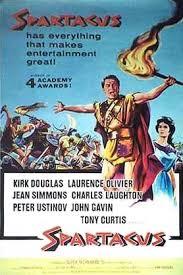
Spartacus (Kirk Douglas) was a Thracian slave in the mining pits for the Roman Empire. His rebelliousness earned him the sentence of being chained to a rock to starve to death. He is seen by Lentulus Batiatus (Peter Ustinov), a businessman looking for gladiator material. One of the slaves he buys is Spartacus. Lentulus brings his selections to his gladiatorial school where they are trained by Marcellus (Charles McGraw).
While he is being trained, he meets Varinia (Jean Simmons). They unobtrusively begin a relationship. When Varinia is sold to a visiting senator, Marcus Licinius Crassus (Laurence Olivier), Spartacus becomes enraged. He attacks and kills Marcellus. This incites the other slave gladiators to revolt. They kill all the guards and escape into the hills.
The Roman senate is in an uproar due to the escaped slaves wreaking havoc all over the countryside. Gracchus (Charles Laughton) suggests they send Marcus Publius Glabrus (John Dall) to squash them. Crassus, who has designs on ruling Rome, is not happy that his protégé is sent out of Rome. Gacchus’ protégé Julius Caesar (John Gavin) is put in charge of the soldiers still in the city. Much infighting ensues in Rome between the senators. Crassus and Gracchus play a deadly game of chess for the power of Rome.
Meanwhile Spartacus is gaining a growing army of slaves ready to trounce Rome. Varinia escapes from Batiatus and meets up with Spartacus where their growing love blossoms amid the turmoil. Spartacus’ main goal is to get enough wealth to pay Cilician pirates to take them all to other lands. When Rome bribes the pirates to abandon the slave army, they have no ships to escape Italy. The Romans send troops to corner Spartacus and his men against the sea. Spartacus has no choice but to advance on Rome and try to beat the entire Roman army.
“Spartacus” was released in 1960 and was directed by Stanley Kubrick. It was based on the 1951 novel by Howard Fast. It is an American epic sword and sandal movie. The movie won four Academy Awards. In 2017, it was selected for preservation in the United States National Film Registry by the Library of Congress as being "culturally, historically, or aesthetically significant.
Considering all the personality and visionary issues between Kubrick and Douglas it’s a wonder the film was made at all. When everyone wants to be the pretty one, it gets ugly pretty fast. Perhaps it was Trumbo’s script, Alex North’s scoring or the talent of the actors that made the difference. Whatever it was, it made “Spartacus” a grand production that further cemented the epic film of the 50’s and 60’s and put the film in the same company as “The Ten Commandments” 1956 and “Ben-Hur” 1959.
Dalton Trumbo wrote the screenplay for the film. Trumbo had been blacklisted in the early 50’s when during the House Un-American Activities Committee, he refused to testify before congress. He was named as one of the “Hollywood Ten”. A term used during the cold war applied to those persons that were believed to be Communists or communist sympathizers and were barred from working in Hollywood. Trumbo continued to write, however, he had to use pseudonyms to get his work accepted. Douglas insisted that Trumbo be given screen credit for his work on “Spartacus” thereby breaking the blacklist taboo.
The movie had a cast of 10,500. Eight thousand trained soldiers from the Spanish infantry were used to double as the Roman army. Reportedly, around fifty thousand (extras) were used in the battle sequences, which were supplemented by dummies and painted backdrops.
In one scene Crassus (Sir Laurence Olivier) is subtly trying to seduce a slave named Antoninus (Tony Curtis). He asks Antoninus if he prefers oysters or snails, which was code for women or men. When Antoninus responds oysters, Crassus says he likes both. The Production Code Administration, in a rare display of awareness of the reference, suggested that they change the dialogue to truffles and artichokes which basically have no meaning and takes away the reason for Antoninus to run away and escape from being raped. In the end the scene was cut. It was put back in the 1991 when the film went through restoration.
Unfortunately, the soundtrack for that particular scene had been lost so the dialogue had to be redubbed. Tony Curtis was able to redo his lines, but Olivier had passed away. Olivier’s widow Joan Plowright remembered that Anthony Hopkins could do an impression of Olivier that was perfect. She mentioned the fact to the restoration team who approached Hopkins. Hopkins agreed to provide the voiceover for Olivier. Hopkins is thanked in the credits for the restored version.

